
| |||
| COMMENT | CONTACT | BACK ISSUES | CBZ MASTHEAD |
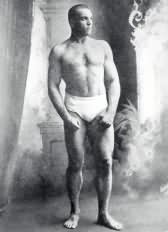 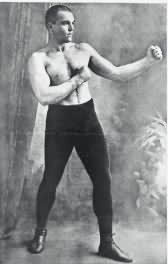  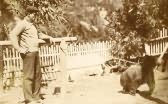 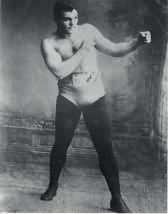 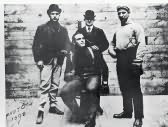 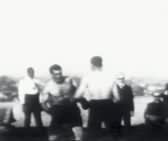 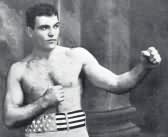 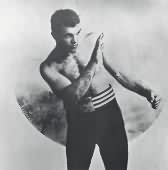 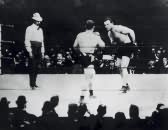  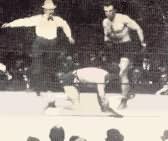 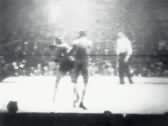 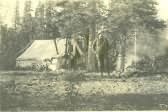 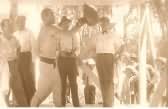 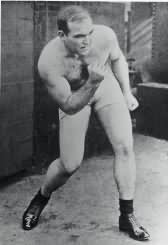 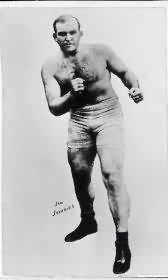 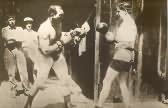 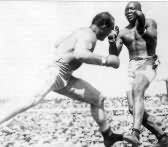 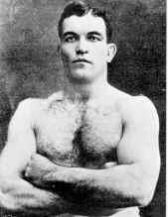 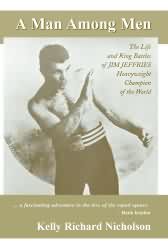
|
Jeffries and Other HeavyweightsBy Tracy G. Callis,Boxing Historian IBRO (International Boxing Research Organization) Jim JeffriesJim Jeffries won the Heavyweight Championship of the World the same way he accomplished most things in his life – he made up his mind he wanted it and battered down anyone who got in his way. Jeffries, along with Rocky Marciano, are two of the most highly criticized Heavyweight Champions, due to their crude styles of fighting, but they were also the only two men to retire unbeaten during their active careers.Unfortunately, Jeffries was talked into a comeback - after being out of the ring for six years - and experienced the only loss of his career. For this fight, he shed 70 pounds, had no warm up fights prior to the contest – only sparring sessions and a few exhibitions, and fought in 110 degree weather against a very, very good fighter, Jack Johnson. Johnson was at his peak and had fought 42 bouts since Jeffries had retired. Jeffries was rusty and "over-the-hill." Yet, today, many analysts pretty much judge him on the basis of this fight. As a fighter, Jeffries traded on strength, power hitting, a tough chin, wonderful stamina, and an indomitable will. He was a heavy hitter with both fists and caved in the ribs of many opponents with his sledge-hammer left hook – Bob Fitzsimmons, Jim Corbett, Tom Sharkey, Gus Ruhlin, and Pete Everett to name five. He also sent Joe Goddard to the hospital after a heavy battering. Sportswriter Harold Keith wrote, "Jeffries probably owned the deadliest left hook the prize ring has ever known." Promoter Tex Rickard said, "he’s the hardest hitter I ever saw and that includes Dempsey." Jeffries, himself, once said he never hit a man as hard as he could for fear of killing him. Some writers portray Jeffries as slow-moving and ponderous. This is not true. He was able to move very fast. He tracked down and knocked out clever Peter Jackson, the all-time great boxer-puncher. He cornered and hammered Bob Armstrong, the 6’4", fast-moving, sharp-jabbing black. He outran the speedy Jim Corbett, Bob Fitzsimmons, and Joe Choynski in footraces and all of these men were fast runners. In addition, Jeffries could jump high into the air – over six feet. One account says he could even perform as an acrobat by jumping into the air, tapping the ceiling of a room with his feet and landing on his feet. Some critics call Jeffries a "one-armed" fighter. This is not true either. He threw short, straight, jolting blows with each fist when fighting in close. He also used a thundering right uppercut. From a distance, he utilized a punishing left jab and a bashing left hook. Further, he used a crouch which made it difficult to hit him cleanly. When an opponent moved in to strike him, he ran the risk of getting hammered with that left hook or having Jeffries spring forward quickly and pound away with those short, bludgeoning left-right blasts. Sometimes heads collided but that never phased Jeffries' hard dome. If a skirmish became distasteful, Jeffries would take hold of his man and shove him backward 5-6 feet with his enormous strength and resume the battle from there – stalking his man, resembling a bear as he moved forward. Interestingly enough, Jeffries also reminds one of a bulldog when seen in his crouch. The Jeffries chin was a phenomenal structure and it would certainly hold up against most of the "best ever" hitters. The dynamite puncher Tom Sharkey punched at it in two contests and could not hurt it. Bob Fitzsimmons and a number of others broke their hands and injured their wrists hitting it. The Jeffries stamina was awesome too - if he could not outbox an opponent, he could certainly outlast him. He fought two grueling fights with Tom Sharkey, endured two punishing battles with Bob Fitzsimmons, and chased down shifty Jim Corbett in two long contests. The Strongest Big FellowsJeffries, George Foreman, Sonny Liston, and possibly Jess Willard were probably the strongest and most powerful big men among the more notable heavyweights of boxing history. Comparing these four men, Foreman was possibly (slightly) the hardest hitter, Liston was the bounciest and quickest heavy hitter, and Willard was an awesome hitter when he landed his big punch on a man. Recall, he hit "Bull" Young so hard that the blow either snapped Young’s neck or sent him to the floor so hard that his neck popped when he struck the floor (depending upon the report you believe).Jeffries was, without a doubt, the strongest. He also possessed the greatest stamina and the toughest chin. He could hit hard too. I suspect he had better legs as well. Rating these four men against each other, I would rank them (1) Jeffries (2) Liston (3) Foreman (4) Willard. Great Fighters and Hypothetical MatchesToday, many analysts "put down" the skills of Jim Corbett, Bob Fitzsimmons, and Tom Sharkey – three of Jeffries' top rivals. But, the people who actually saw them fight rated these men highly and continued to do so even after Jack Dempsey, Gene Tunney and Joe Louis appeared on the scene.Jim Corbett Corbett was "jack-rabbit" quick with very fast hands and feet. He could maintain his speed for the duration of a fight (15-20 rounds) and not slow considerably. Gene Tunney sparred with him in the 1920s and was impressed. The quick hitter, Bob Fitzsimmons, said he couldn’t hit Corbett in the head. Most men who faced him couldn’t strike him effectively. Jim was probably the fastest of all heavyweights over the "entire" course of a fight. Muhammad Ali was equally fast in the early part of a fight but as the fight wore on, Ali’s weight had its say and he slowed as he tired. In spite of Corbett’s speed, Jeffries defeated him twice - in a large ring! Bob Fitzsimmons Bob Fitzsimmons was a devastating puncher with his whipcord muscles molded by his work at the blacksmith’s anvil. Many who saw Fitz in action considered him to be the best hitter ever. He was compared favorably with Dempsey even when the latter was champion. Nat Fleischer ranked him higher than Jack on his All-Time Heavyweight list. Yet, Jeffries defeated him twice, the first time in only Jeffries’ 13th fight with the Heavyweight Championship at stake. Tom Sharkey Many critics question Jeffries’ close wins over Tom Sharkey and point to the easy Fitzsimmons victory over "Sailor Tom." But, Sharkey was a great fighter and a tough warrior, just about the equal of Rocky Marciano in size, strength, style, ruggedness, and power. Had he fought at any other time in history, he might have been champion. So, when Jeffries fought Sharkey, in essence he fought Marciano – no easy task! For their first fight, Tom was unbeaten, had engaged in 34 fights and scored 27 knockouts. He had been in the ring against such men as John L. Sullivan, Jim Corbett, Bob Fitzsimmons, Peter Maher, Joe Choynski and Joe Goddard. It was only Jeffries’ 11th fight. Inspite of this disadvantage, Jeffries won a close decision. When they fought the second time in what many historians call the "greatest heavyweight fight in ring history," it was for the Heavyweight Championship and only Jeffries 14th fight. During training, Jeffries injured his left shoulder and the fight was delayed. After a short time, a physical checkup revealed the injury was not fully healed and the contest was postponed again. Following a third physical examination, the medical doctor recommended putting off the bout once more but Jeffries said "No." He went ahead with the fight and got in against Sharkey with his greatest weapon – the left hook – weak and ailing. In a furious, brutal battle, Jeffries floored Sharkey, broke two of his ribs and battered him to a pulp. One of Sharkey’s ears was swollen to the size of a softball. After a time, Jeffries offered to fight all three of these men on the same night – they refused. Jack Dempsey Some contend that Jack Dempsey was just a little too small to defeat the very best heavyweights of all time. I have never bought into that argument. Dempsey was an exceptional fighter who moved well and hit with tremendous power. He used a crouch and bobbed and weaved too. His greatest weakness was long term stamina. In the case of Dempsey versus Jim Jeffries, size and stamina would be the deciding factors - in favor of Jeffries – after a "war." Joe Louis Joe Louis was a magnificent fighter who was patient, powerful, and possessed two very fast hands. But, Joe had considerable trouble with men who fought from a crouch – Tony Galento, Tommy Farr, and Arturo Godoy, for example – and they were no where close to being a "Jim Jeffries". Further, Joe did not have the toughest chin. After a patient but tense battle with flurries of hard punching from time to time, Jeffries would finish off Louis. Rocky Marciano Rocky Marciano was a determined, bulldog of a fighter who hit with power much like Tom Sharkey of the 1890s who gave Jeffries two great, desperate battles. A Jeffries-Marciano fight would be a replay of the Sharkey fights. After rounds of hard slugging, Jeffries would batter Rocky enough to win. Sonny Liston Sonny Liston was a "Black Jeffries." He was big and strong and could take a solid punch. In his movements, he was quicker than Jeffries but his strength and stamina were not as great as Jim’s. Their hitting power was about the same. In a Jeffries-Liston bout, these two men would go toe-to-toe, each man pounding away and then covering up, until one finally gave out. Jeffries’ stamina and chin would prevail in a close, close, close fight. Joe Frazier - George Foreman - Muhammad Ali The chin and stamina figure in greatly when contemplating Jeffries-Frazier, Jeffries-Foreman, and Jeffries-Ali fights. Foreman, Frazier, and Ali all pounded George Chuvalo unmercifully but none of the trio could put him down. Chuvalo’s chin was close that of Jeffries and these men would not put Jeffries down either. In addition, Jeffries was a much greater overall fighter than Chuvalo and a much better hitter as well. Consequently, these wonderful fighters would be getting hit against Jeffries whereas they were not against Chuvalo. Joe Frazier Joe Frazier was a very good fighter who was tough, fought from a crouch, bobbed as he moved, and carried a dangerous left hook. He came to fight – not run. Against Jeffries, he would be in against a man with the size and power of George Foreman and the result would be the same. Jeffries would be too big and strong for Joe, who could not run from him. George Foreman When considering a Jeffries-Foreman fight, one cannot help but think of the Foreman-Ron Lyle fight. Allowing Lyle credit as being a "near-equal" of Jeffries as a hitter (questionable and doubtful), he nearly finished Foreman. But, Lyle had no where near Jeffries’ stamina - his wind and chin gave out. Jeffries would not have wilted and it would have been a tired George Foreman who ended up on the canvas for keeps. "Cute" Fighters Jeffries would have his most trouble against the "cute" type of fighter – Corbett, Johnson, Tunney, Ali, and Holmes. These men would have to "hit and run" because any man Jeffries could hit, he would beat. None of these men would put Jeffries to the floor. But, they could cut him up. Each would have to keep his distance, move, jab, and pick his moments to move in and hit hard. After hitting, they would have to get away quickly (in other words, "get the hell out of Dodge"). They would have to be careful in anticipation of Jeffries’ moves – the bashing left hook, the springing out from his crouch so he could catch them (also the possibility of cracking heads as he sprang forward) and the left-right slams in close. If they carried out their plan and kept up their pace of movement (and did not slow as they tired), they would have a chance. Mike Tyson - Evander Holyfield - Riddick Bowe - Lennox Lewis Of the heavyweights since the 1960-1980 period, Mike Tyson, Evander Holyfield, Riddick Bowe and Lennox Lewis standout but all fall short of being a serious threat to defeat Jeffries. Tyson falls into the category of Tom Sharkey, Rocky Marciano, and Joe Frazier – hard-hitting and tough but not tough enough. Jeffries would beat him. Holyfield is "all-around" fighter who finds a way to win. But, like Jack Dempsey and Joe Louis, he was not strong enough to hold off Jeffries. Riddick Bowe was big and strong but he was battered by Andrew Golota, a man whose fighting style and strength was similar to Jeffries’. However, he did not have Jeff's chin and was not nearly Jeffries' equal as a fighter. Jeffries would beat Bowe. Lennox Lewis is a talented fighter with a good jab, stiff punches and pretty good boxing technique. However, he appears "up and down" in his performances and has a tendency to sometimes let some good in-fighters get close to him (like Larry Holmes did from time to time) and it would prove fatal against Jeffries. At other times, he tends to get into a rock 'em sock 'em style and that would spell disaster against Jeff. Muhammad Ali Now, a few comments about Muhammad Ali, the self-proclaimed "greatest" and a man whose claim is supported by many fans today. Ali was a remarkable boxer. He was fluid, quick, and able to anticipate his opponents’ moves. As a fighter, he made a number of mistakes (as all fighters do) but was able to outrun them due to (1) his outstanding speed, (2) the caliber of many of his foes and (3) their fighting styles being ideal for Ali's moving jabbing game. He possessed wonderful quickness especially during the early part of a fight. But, due to his weight, he tired and slowed as the fight wore on. During his era, Ali was able to defeat his competition when he slowed during a fight but it is doubtful if he could have done this against the very best heavyweights of all-time. Ali was bothered by the crouch (as are most fighters). He also got tagged with some tremendous shots during his "second career." When he got hit he usually was able to take the punch or roll with it to reduce its effect. But, by his own admission, he was "out on his feet" three times from punches by George Foreman. When Foreman’s stamina gave out, Ali won. Would Ali be able to withstand the punches of Jeffries for an entire fight? Jeffries possessed power similar to Foreman’s and his stamina did not give out. A close analysis of Ali's performance in the ring reveals that "Fate" smiled upon him in the first Henry Cooper fight following his visit to the canvas. He could have been knocked out. Ken Norton beat him once officially (and, in the view of this writer, deserved wins in all three bouts). Jimmy Young outboxed him and deserved the win. Joe Frazier beat him in their first battle and possibly the second fight too. George Foreman was "duped" in Africa but George probably would have won in a return match. Leon Spinks beat him too. Against Jeffries, Ali would have faced a man who crouched (always troublesome) like Joe Frazier and at the same time had the size and power of George Foreman. In addition, Jeffries had much greater stamina than George and faster footwork than either Frazier or Foreman. Strange as it sounds, Jeffries would edge Ali, probably by a decision. ErasDifferent periods of history, due to existing conditions and philosophies, impart certain characteristics to its people. The early years of this century gave to its fighters better qualifications to perform and survive in the ring. A period of manual labor, hard work, and hunger cultivated in its people the determination, mental discipline, strong willpower, physical conditioning, perseverance, and willingness to struggle and endure in order to survive. Its fighters (from all races and nationalities) showed more persistence, spunk, and energy than those of more recent, affluent years. Since all groups (races) of people were very much deprived in those days, they all produced great fighters.Some analysts assert that technique improves over the years and makes the fighters better. Generally speaking, this is true. But, in the case of men who have size and strength – Jeffries, Liston, Foreman, Willard, etc., - they need technique less than other men do. It is the opposition that needs improved techniques in order to avoid these powerful men. The J's Have ItIn rating the greatest heavyweights of all-time, the J’s have it. The four All-Time best heavyweights were Jim Jeffries, Jack Johnson, Jack Dempsey, and Joe Louis. The younger Ali was very fast but not strong enough to hold off these All-Time greats. The older Ali was very strong but not fast enough to hold off these All-Time greats.Many people hypothesize that during the "lost years" Ali would have put it all together – speed and strength – and would have been the greatest heavyweight ever. Possibly - but this is a guess. It just might have been that during this transition period, he had not yet acquired the strength necessary to carry him through his toughest battles after he had lost his super quickness. Acknowledging that Ali dominated his era and was the greatest heavyweight fighter since Joe Louis, he belongs in the top echelon of All-Time Heavyweight greats as the #5 man. The GreatestThe "Jim Browns" of history are the greatest athletes. Howard Cossell once said Muhammad Ali was the best heavyweight he had seen – that is, until Jim Brown decided to enter the ring. Well, Jim Jeffries was the "Jim Brown" of his time and Jeffries did enter the ring.In 1899, Jim Jeffries was Heavyweight Champion of the World and the greatest heavyweight fighter ever to enter the ring. Today, in 2003, more than one hundred years later, he is still the greatest heavyweight fighter ever to enter the ring. A Man Among MenProfessor Kelly Richard Nicholson, writer and boxing scholar, has just published a book about Jeffries entitled "A Man Among Men" available via the link to the right. |
||
| Upcoming Fights | Current Champions | Boxing Journal | CBZ Encyclopedia | News | Home |